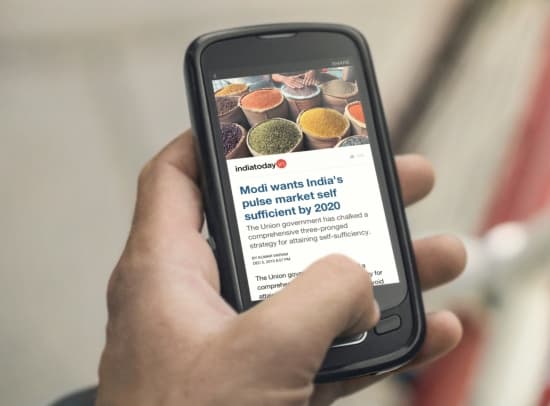Facebook ‘Instant Articles’ Now On Android For Speedy Access To News Feed Content
The tech giant that has been in news almost every alternate day for the launch of various new features on its platform such as Photo magic, its professional services, year in review, free basics etc. Recently, they have come up with yet another feature to make its users lives easy. Called 'Instant Articles', the feature has been made available on Fcebook's Android app. The feature is already accessible to iPhone users. It allows users to quickly view news articles which are hosted on the speedy network of the world’s biggest social network.

Anybody who uses Facebook through its Android app, can now read hundreds of Instant Articles from publishers worldwide every single day in their news feed. More than 350 publications globally, including India, have signed up for the initiative, and more than 100 publishers are already publishing daily.
The feature helps people with slower internet connections seamlessly browse by staying on app itself instead of reverting to a different website when they try to access an article on publishing partner’s website.
A lightening symbol on an article, means it is one of the instant articles, and clicking on it would enable users to have an enriching reading experience without consumption of a lot of data or band width.
Facebook observes that abounding reading experience inspires people on Android to share added Instant Articles with friends more often than they do with standard web articles. The articles are loaded for ten times faster viewing compared to standard connections.
The feature also ensures to make available a few story-telling tools, high resolution pictures and interactive gears as maps, auto-play videos, audio captions to the publishers to make the reading experience more rewarding.
India partners include mainstream media such as - Aaj Tak, ABP news, Dainik Bhaskar group, Network18 group, NDTV group, ZEE group and many more, online publications as Scroll, Scoop Whoop, Times Internet, India.com etc. The media group would get complete revenues from all ads they sell related to articles and split revenues for ads sold by Facebook.
The new project is under the critical eye of analysts though, for the fear of publishers risking their autonomy, reader loyalty and content. However for the time being it sure offers the promise of an enhanced user experience and better product advancement.
Source: #-Link-Snipped-#

Anybody who uses Facebook through its Android app, can now read hundreds of Instant Articles from publishers worldwide every single day in their news feed. More than 350 publications globally, including India, have signed up for the initiative, and more than 100 publishers are already publishing daily.
The feature helps people with slower internet connections seamlessly browse by staying on app itself instead of reverting to a different website when they try to access an article on publishing partner’s website.
A lightening symbol on an article, means it is one of the instant articles, and clicking on it would enable users to have an enriching reading experience without consumption of a lot of data or band width.
Facebook observes that abounding reading experience inspires people on Android to share added Instant Articles with friends more often than they do with standard web articles. The articles are loaded for ten times faster viewing compared to standard connections.
The feature also ensures to make available a few story-telling tools, high resolution pictures and interactive gears as maps, auto-play videos, audio captions to the publishers to make the reading experience more rewarding.
India partners include mainstream media such as - Aaj Tak, ABP news, Dainik Bhaskar group, Network18 group, NDTV group, ZEE group and many more, online publications as Scroll, Scoop Whoop, Times Internet, India.com etc. The media group would get complete revenues from all ads they sell related to articles and split revenues for ads sold by Facebook.
The new project is under the critical eye of analysts though, for the fear of publishers risking their autonomy, reader loyalty and content. However for the time being it sure offers the promise of an enhanced user experience and better product advancement.
Source: #-Link-Snipped-#
0
